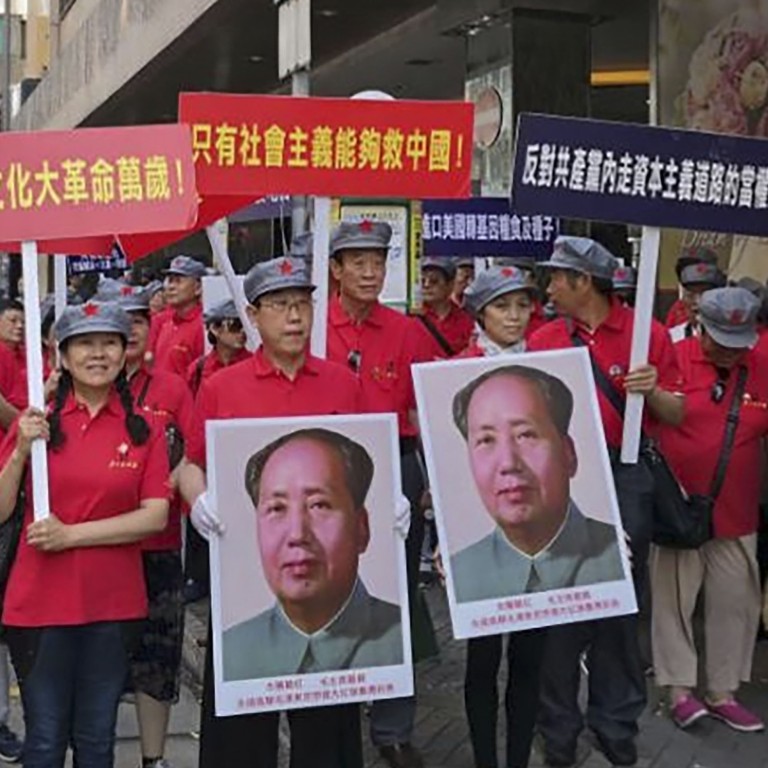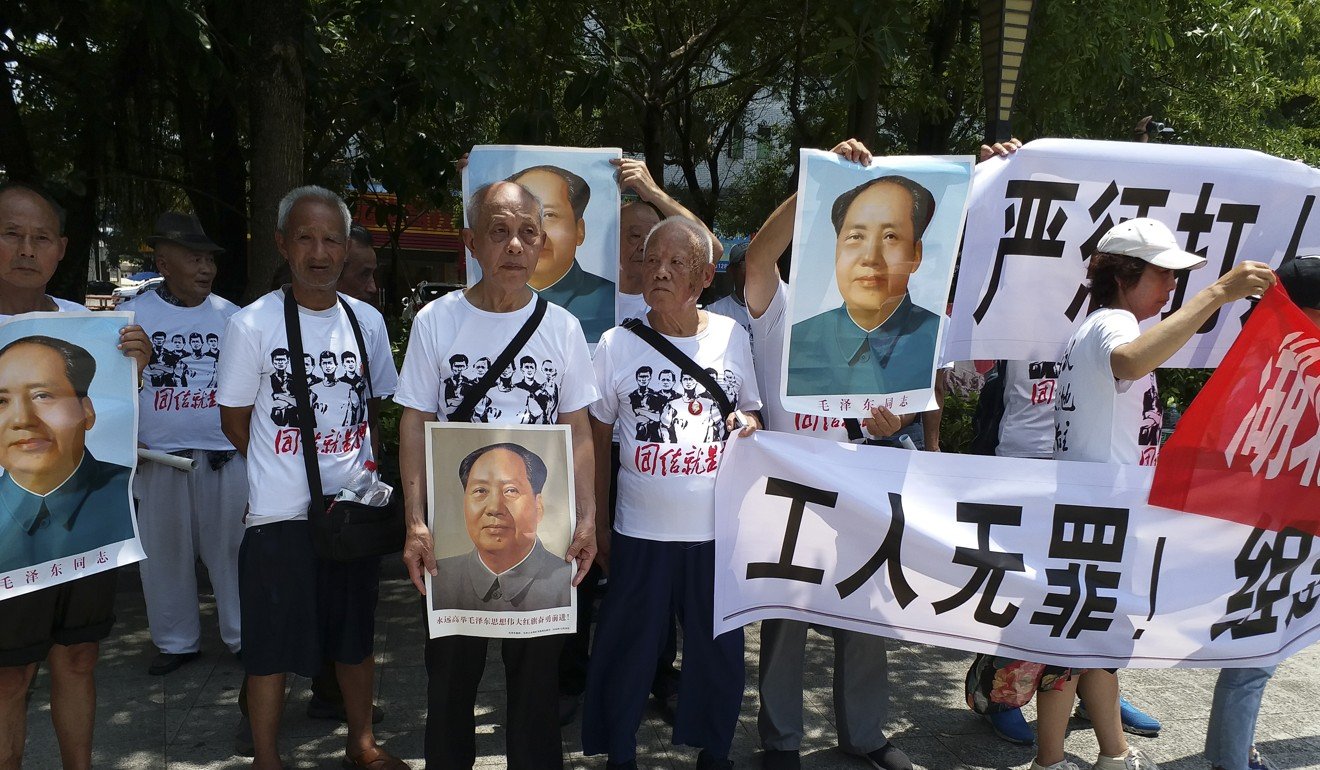
The underrated influence of modern neo-Maoists on China’s Communist Party
- In ‘The New Red Guards’, Jude Blanchette argues that in market-focused China, the party sees neo-Maoists as both a headache and a help
- While they challenge the party on occasion, their extreme ideological positions can also make it appear more reasonable
On the heels of a relentless anti-corruption campaign, a growing number of job titles and an end of term limits that allows him to be leader for life, President Xi Jinping is increasingly seen inside and outside China as its most powerful leader since Mao Zedong.
Harsh crackdowns, stepped-up study sessions of “Xi Jinping Thought” and a growing tilt toward one-man rule have further strengthened Xi’s association with modern China’s founding father.
For many people, the scope of Xi’s ambition only became apparent with time. But one group, the neo-Maoists, recognised and embraced Xi early, drawn to his belief in a strong, centralised Communist Party, tighter state control over the economy and unabashed nationalism.
C hina’s New Red Guards: The Return of Radicalism and the Rebirth of Mao Zedong by Jude Blanchette, a 200-page book published this month by Oxford University Press, is an absorbing look at an underappreciated political force and its role in the one-party state.
“Neo-Maoism is essentially a later incarnation of that very old debate that’s been happening, of those who feel like China’s reform trajectory is creating too many losers,” Blanchette said at the Wilson Centre's Kissinger Institute on China and the United States earlier this month.
“They also understood that Mao Zedong, the imagery, the person, the symbolism, was a powerful tactical tool in pushing back against the Communist Party.”
Watch: Xi Jinping talks “socialism with Chinese characteristics” in 2017
Neo-Maoism became noticeable during Hu Jintao’s 2002-2012 presidency, although much that drives it predates Hu. Fuelling neo-Maoism – a far-left movement that wants China and the party to return to its hardline roots – are several forces.
These include the Communist Party’s 2000 embrace of capitalists, the wholesale lay-offs from state-owned companies after the late 1990s and the spread of Western ideas, influence and market reforms accompanying China’s 2001 accession to the World Trade Organisation.
China’s Maoists find refuge in capitalist Hong Kong
During the Hu years, the disgruntled group coalesced around Utopia, a popular left-leaning nationalist website and Beijing bookstore started in 2003, and other websites such as Maoflag, that drew on economic discontent, expansion of the internet and nostalgia for Mao, who died in 1976. Analysts say the movement’s endurance suggests it has been useful for the party.
As Hu’s reign waned, neo-Maoists morphed from activists into a political movement, Blanchette argues, through their association with Bo Xilai.
Bo, a charismatic and ambitious Chongqing party chief, espoused a return to “red culture”, tighter state control and neo-leftist ideology until his life imprisonment in 2013 on charges of abuse of power and corruption.
Watch: Bi Xilai loses his appeal and has life sentence upheld in 2014
With Bo’s downfall, the hammer also came down on neo-Maoists, and Utopia’s website was closed.
But in a sign of the movement’s resilience, Utopia reopened six months later, the movement retrenched and, Blanchette says, has since enjoyed relative leniency amid Xi’s intense crackdown on civil society and intellectual discourse.
Open criticism inside China of one-party rule tends to conjure up the likes of the exiled Tiananmen student leader Wang Dan; human rights activist and Nobel Peace Prize laureate Liu Xiaobo, who died in Chinese detention in 2017; and even exiled artist Ai Weiwei.
But neo-Maoists have often directly challenged the ruling party with fewer consequences. Those confrontations include their support for Bo, their mid-2000s call for the sacking of Premier Wen Jiabao for “grave errors and crimes” and cries to upend a party they see as increasingly bureaucratic and obsessed with stability.
In recent years, Neo-Maoists have seen their political space narrow and their activities knocked back along with many others.
Xi Jinping doesn’t talk much about Mao. The vibe you get, this is a new era. All you need is Xi Jinping.
Starting around 2018, Maoist and Marxist student activists from elite Chinese universities have been increasingly detained and their websites closed for supporting migrant workers agitating for more rights – in theory a core party mandate.
But they have arguably fared far better under Xi than women’s and religious groups, Uygurs, non-government organisations and others.
One reason seen for this endurance is the support they enjoy from some Communist Party princelings and other elites, some say. Another is their affiliation with Maoist and Marxist symbolism and orthodoxy, making it more difficult politically for the party to go after them.
“It shows up the hypocrisy: ‘You call yourself a revolutionary Communist Party but you’re increasingly a bureaucratic plutocracy,’” said Timothy Cheek, director of the University of British Columbia’s Centre for Chinese Research. “It’s like liberation theology going against a corrupt papacy. It’s really awkward.”
Watch: Neo-Maoists celebrate the Cultural Revolution in 2018
Neo-Maoists may also serve a useful purpose for the party, by trolling and otherwise intimidating liberal activists in ways arguably more effective than traditional party censorship.
The group’s more extreme ideological position can also make the party under Xi appear more reasonable and give Beijing cover when negotiating with foreign trading partners.
This allows the party to argue, for instance, that it faces too much pressure from left-wing extremists to make concessions that could make China look weak.
It’s difficult to get a handle on the exact number of neo-Maoists given limited data and party concern over groups deemed sensitive, but Blanchette estimates it’s in the tens of thousands. More concerning to the party than the number of “card-carrying” members is the bigger group who sympathise with its concerns, he added.
The Chinese people often are viewed from afar as largely apolitical or, in the prescriptive words of Deng Xiaoping, China’s paramount leader after Mao, “economic animals and political vegetables”.
Chinese Maoists join students in fight for workers’ rights
But Blanchette’s depiction of neo-Maoists’ ingenious ability to carve out political space suggests that the Chinese, if allowed, can quickly amplify their voices.
“It’s highly difficult to become political if the state puts great energy into repression,” Blanchette said in an interview with the SCMP . “Any time a crack is perceived, you see this rush of political activity. Chinese people are as deeply political as any other people in the world.”
As Blanchette sees it, there is little direct linkage between neo-Maoism and the populist nationalism that has fuelled US President Donald Trump’s election, the rise of right-wing European parties and the Brexit movement in Britain.
The movement is, however, part of a broad global response to rapid economic change and anger over globalisation, automation and perceived elitism. “They’re all feeding on the same intellectual currents,” he said.

Among the most effective tactics that neo-Maoists and other Chinese activists employ are taking advantage of openings or leadership weakness and tying actions to historical speeches and anniversaries.
Thus, advocates of class struggle and wealth redistribution might use Mao’s birthday to raise their core issues – just as pro-democracy activists might use the anniversary of the Tiananmen Square crackdown – putting the party in a tight bind.
While this is used elsewhere – as seen in the US debate over its Confederate monuments, which is a proxy for issues of race and ethnicity – in politically constrained China, it is more pronounced.
Blanchette says he grew interested in neo-Maoists after noticing their animosity toward liberalism and their attacks on the party from the left rather than the right.
Chongqing still grappling with ‘pernicious legacy’ of Bo Xilai
This came even as most assumed that Maoism was all but vanquished by economic reform and China’s explosive growth. “I’ve always been really fascinated by conspiracy groups,” he said.
A long-time student of Communist Party politics, Blanchette said he set out to write a book that “my uncle” could read and enjoy. That has required simplifying the movement’s many strands, focusing on the Utopia crowd and ending his account in 2015 – before the movement splintered.
Blanchette’s uncle aside, China’s New Red Guards might have benefited from a tighter focus on one or two characters as a narrative vehicle and a broader look at the larger ecosystem and Chinese society’s struggle for more varied political voices.
That said, Blanchette’s keen insights and his befriending of, and direct reporting on, many neo-Maoists provides a hugely valuable look at this little-appreciated world.
While Xi often evokes comparisons with Mao, scholars say he doesn’t tend to mention the Great Helmsman much himself.
China’s nearly 90-million party members are now required to study “Xi Jinping Thought” daily, reportedly helped by the handy “Xuexi Qiangguo” app, which is replete with quizzes and a point system to encourage participation.
“Xi Jinping doesn’t talk much about Mao,” said Andrew Nathan, a political science professor at Columbia University. “The vibe you get, this is a new era. All you need is Xi Jinping.”
Analysts say the neo-Maoist movement spotlights how different groups, to serve their differing purposes, invoke different Mao imagery, including good, bad, radical, historical and feel-good Maos.
Chinese universities race to establish Xi Jinping Thought institutes
Thus, Xi’s control-obsessed administration employs an early 1950s Mao who rebuilt the nation, reduced foreign influence and organised the masses in lockstep behind his leadership, stopping the clock when things got a bit whacked.
Neo-Maoists, meanwhile, evoke a more holistic Mao who encompasses all that but also a willingness to upend a party seen drifting from its revolutionary ideals.
This use of “ritual theatre” suggests order, continuity and “beautiful if vague” political meaning for many Chinese struggling with rapid change. “Yes, it’s Maoism,” Cheek said. “But you can sing different songs in the key of Mao.”
Some, meanwhile, argue that Xi-Mao comparisons don’t go far enough. Nathan contends that Mao, who delegated policy issues that bored him, was less powerful in some ways than Xi, who seems to “follow everything 24/7”.

Xi also seems intent on replicating Mao’s use of the party as a “classic organisational weapon” in which the leader can put his “foot on the accelerator and 90 million people respond instantly”, Nathan added. “He’s trying to do it.”
One huge challenge that Xi shares with Mao – and other leaders coveting largely unchecked power, from the absolute monarchs of yore to Cuba’s Fidel Castro and the Soviet Union’s Joseph Stalin – is their reluctance to plan for a peaceful and orderly succession and the difficulty of getting good information when surrounded by “yes” people.
“Once you’re on the throne, you want to stay as long as you can,” Blanchette said. “And if an all-powerful leader doesn’t tolerate dissent, he will not get good information. That’s a universal truth.”

